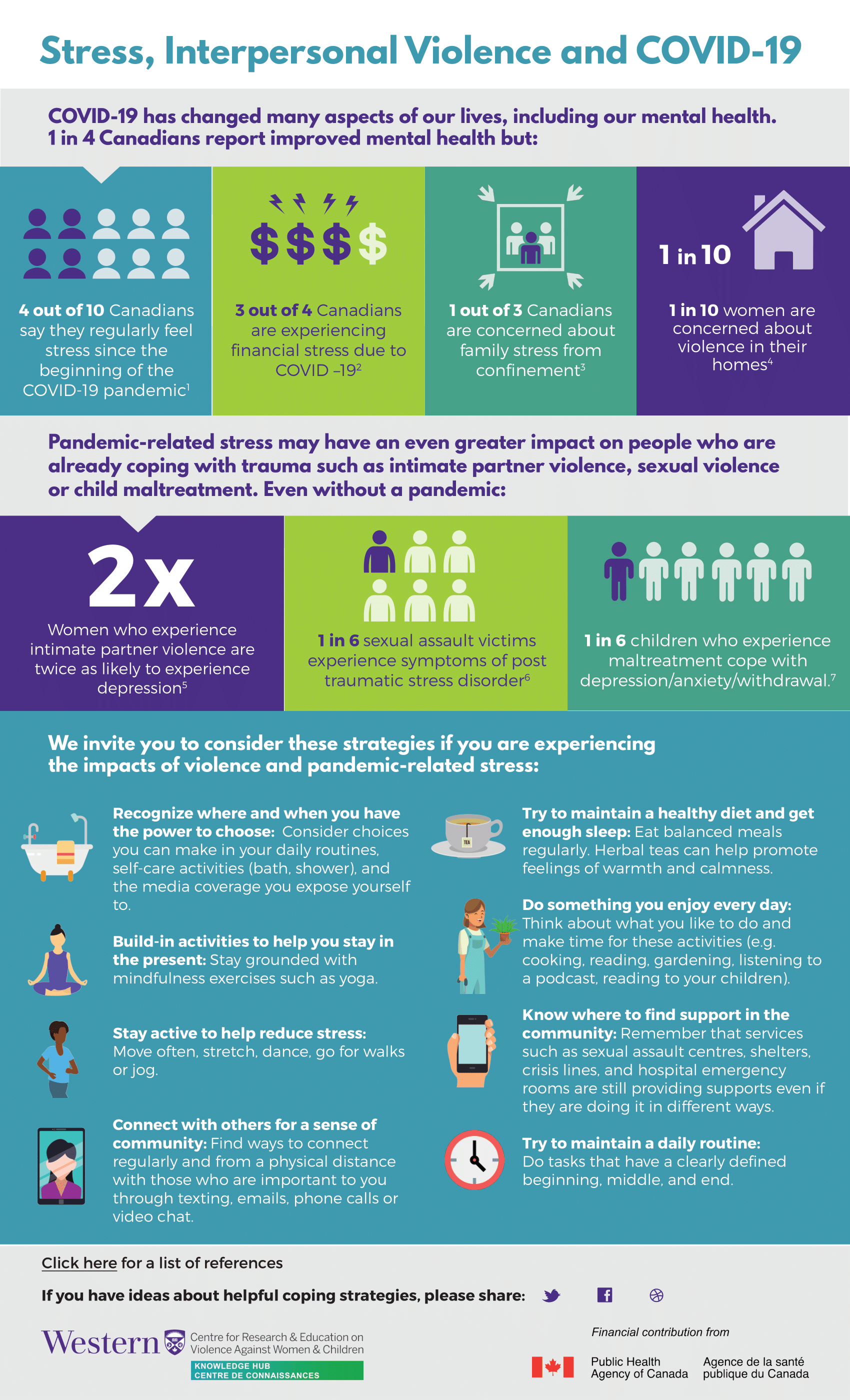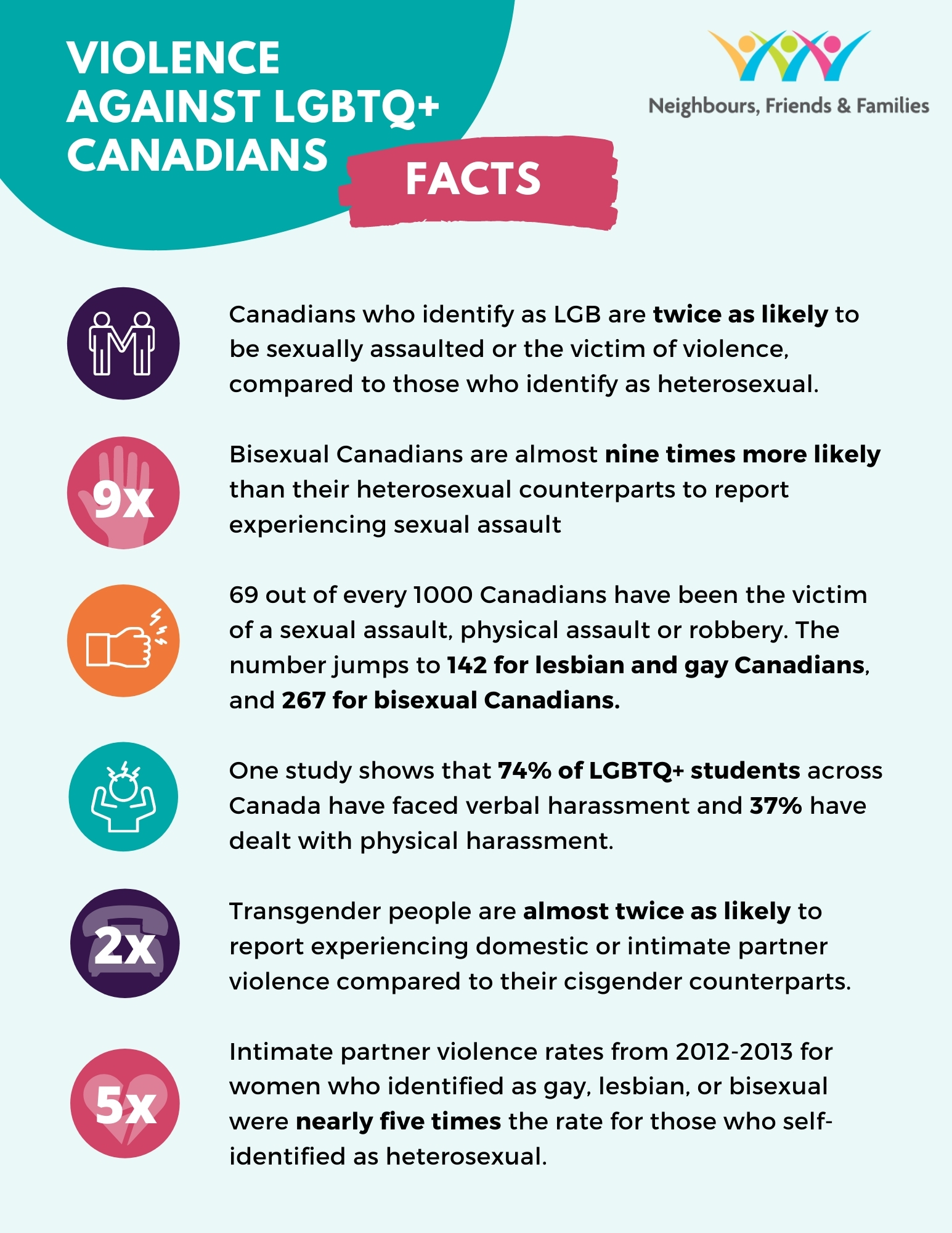Briefs and Reports
The Centre for Research & Education on Violence Against Women & Children at Western University, together with researchers at the University of Toronto and the Canadian Labour Congress launched a bilingual, national survey on workplace harassment and violence in Fall 2020. Closing in Spring 2021, thousands of workers across Canada completed the survey and a significant number volunteered to participate in in-depth interviews.
Harassment and violence at work remain a major social problem in Canada. The results of this research shed light on the prevalence of different forms of harassment and violence in the workplace, including how workers who are marginalized due to their social location and/or their precarious employment status are uniquely impacted.
Through this research, we have learned more about:
• Workers experiences of sexual harassment and how they intersect with other forms of
harassment and violence in the workplace,
• The actions workers take and their effectiveness,
• Barriers to reporting,
• Forms of retaliation workers experience.
Intervention approaches with children who have experienced trauma, and strategies for teachers, caregivers, and others. By Child Trauma Research Centre (University of Regina).
Gender-Based Violence During COVID-19. A Brief by Child Trauma Research Center (University of Regina)
Young gender diverse people are most at risk for pre-existing and new COVID-19 related forms of gender-based violence. It is important for service providers to increase outreach, share information about risks and potential manipulation tactics, and develop safety plans for gender diverse individuals.
Violence Against Women - Shelters During COVID-19: Concerns and Adaptations. A Brief by Child Trauma Research Center (University of Regina)
Intimate Partner Violence (IPV) has increased during COVID-19. Violence against women (VAW) shelters are concerned about families suffering in isolation and the sustainability of service provision with capacity, funding, and service restrictions.
Intimate Partner Violence and COVID-19 in Rural, Remote, and Northern Canada: Relationship, Vulnerability and Risk (Article by PATHS)
Abstract
In rural, remote, and northern parts of Canada, the pre-existing vulnerability and risk for intimate partner violence has been exacerbated by COVID-19. The purpose of this commentary is to identify the unique impact of COVID-19 on intimate partner violence both in terms of the bearing on those experiencing abuse and on the service sector in rural, remote and northern communities where the rates of intimate partner violence and intimate partner femicide pre-pandemic are higher than in larger cities. The recommendations offered in this paper include enhanced safety planning, alternate housing for victims fleeing violence, and suggestions for service providers. We also offer ways to move forward with further research in the COVID-19 era.
Needs of Newcomer Women Who Experience Intimate Partner Violence: Adjusting to New Life in the Prairies (Report by PATHS)
This study aimed at gaining a better understanding of Newcomer women’s experiences of IPV during their resettlement in the Prairie Provinces. Specifically, the purpose of the study was to consider the impact of, and unique circumstances surrounding, IPV on the lives of Newcomer women and their children in the Prairie Provinces to determine what services are needed to ensure the safety of Newcomer families.
Toward A Trauma - And Violence - Informed Research Ethics Module: Considerations And Recommendations
This document by Working Group of the Knowledge Hub Community of Practice draws upon critical themes emerging from everyday ethical dilemmas discussed by the Working Group, and poses recommendations for a training protocol for trauma- and violence-informed research ethics. In doing so, it seeks to contribute to the broader incorporation of trauma - and violence - informed approaches into the ethical decision-making of gender-based violence researchers.
Breaking the Cycle of Abuse and Closing the Housing Gap: Second Stage Shelters in
Canada
This study by Women's Shelters Canada is the first of its kind in Canada to examine the spectrum of supports for survivors of IPV and how second stage shelters address and close housing gaps and break the cycle of abuse.
Thie 31st Issue of the Learning Network (based at the CREVAWC) newsletter is relevant to shelter workers, child and youth workers, teachers, and community-based services working with children who may have experienced exposure to intimate partner violence.
Intimate Partner Violence & the Workplace: Results of a Saskatchewan Study (Report by PATHS)
"The present study builds on Can Work Be Safe When Home Isn’t?, a pan-Canadian survey conducted by the Centre for Research & Education on Violence Against Women and Children (CREVAWC) at Western University and the Canadian Labour Congress (CLC), which demonstrated that IPV not only impacts victims in their workplaces, but affects their coworkers, as well (Wathen et al., 2014). This work is the second survey regarding the impact of IPV in workplaces to be completed in Canada and the first to focus on the specific impact—and possible solutions—in the province of Saskatchewan."
Domestic Violence Risk Assessment: Informing Safety Planning & Risk Management (Brief by PATHS)
"The primary purpose of conducting domestic violence risk assessment is to prevent violence; that is, to identify and mitigate risks posed by the perpetrator. Thus, risk assessment helps to prioritize cases for intervention (i.e., who is most likely to reoffend, and who requires the most resources?). Risk assessment can also help identify monitoring and supervision strategies (i.e., how can we manage this case effectively in the community?), safety plans for victims (i.e., what security and support measures are necessary?) and management and rehabilitative options for offenders (i.e., what monitoring and psychosocial interventions are appropriate?). A secondary purpose of domestic violence risk assessment is to improve the accountability, transparency and consistency of decision-making."
The Link: Interpersonal Violence and Abuse and Animal Safekeeping (Report by PATHS)
According to Phil Arkow, Coordinator of the National Link Coalition, “When animals are abused, people are at risk. When people are abused, animals are at risk” (Arkow, 2013). This quote reflects the devastating reality that interpersonal violence and abuse and animal abuse rarely occur in isolation from one another. Through discussions with human service providers, animal welfare providers, and stakeholders in Saskatchewan, it became apparent that human service organizations and animal welfare agencies need to work together to address this connection.
Guides
The Getting Out Guide will help you identify the signs of an abusive relationship and how to leave a dangerous situation.
The Safety Planner offers guidance on what to take with you, where you can go, and who you can contact for help.
A brief guide by OUTSaskatoon on navigating consent, boundaries, and different types of relationships.
Infographics & Fact Sheets

This infographic identifies ways the COVID-19 pandemic impacted peoples' lives and the impact it has on intimate partner violence, sexual violence and child maltreatment. Strategies for coping with the impacts of violence and pandemic-related stress are provided.
PATHS conducted an online survey and focus groups & interviews with Saskatchewan workers.
Pamphlets & Booklets
In May 2022, the Supreme Court held that the previous ban on the extreme intoxication defence was unconstitutional. In response, the Parliament of Canada amended the Criminal Code to enable the defence under the condition that a reasonable person could not foresee their loss of control and actions due to self-intoxication. This means that an accused may now say that they were so intoxicated that they took part in actions that they did not wish to or acted in a state of “automatism” due to extreme self-intoxication. The defence can be used for general intent offenses including sexual assault, assault, and manslaughter.
This issue of the Learning Network's newsletter seeks to:
- Identify how the extreme intoxication defence has been used in the past
- Explore the implications of the defence for survivors of sexual violence
- Share best practices for talking to survivors about the defence
A booklet created by the Western University Learning Network. This Glossary provides a central place to find the meaning of key terms in Gender-Based Violence (GBV) work and to access resources for further learning.
Booklet by OUTSaskatoon. A brief history of 2SLGBTQ people in Canada, and an introduction to the barriers and systems that prevent 2SLGBTQ people from experiencing full equality.


